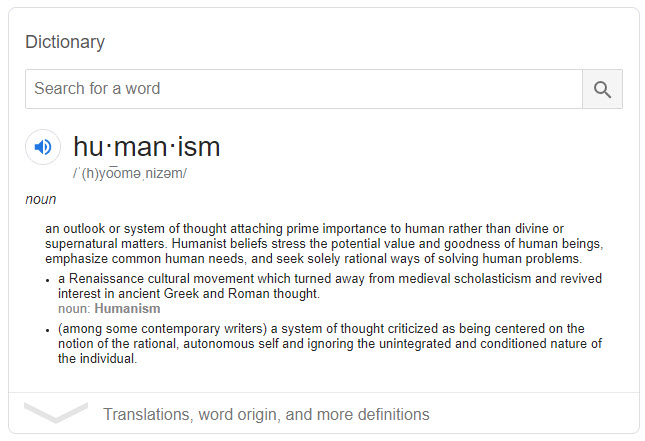Have you ever wanted to know something about Depression, Anxiety, or another mental health disorder and you Googled it? After you began reading one or two articles on the topic, you may have had this sinking feeling that you weren’t getting information that God would be happy with or you maybe thinking, “There is something missing here.”
You may have even found information that did not match up with your Christian belief system or even could have said that your Christian faith was creating or increasing the problem. After that, you may have decided that counseling and psychology was a bunch of “hogwash” or you just wished you could find some good information from a Biblical perspective.
The reason you are running into this issue is because Psychology is grounded in a Humanistic perspective and this has been an issue for Christians since psychology began. The definition of Humanism is, “an outlook or system of thought attaching prime importance to human rather than divine or supernatural matters. Humanist beliefs stress the potential value and goodness of human beings, emphasize common human needs, and seek solely rational ways of solving human problems.”

In short, Humanist believe there is no need to concern yourself with God, because what you need is already within you. Let’s break down that definition and see what we can learn from it.
First of all, we know that “attaching prime importance to human rather than divine,” is a very scary thing to do. We have seen what people do in their pursuit to make themselves feel better or get what they want. I believe the problem of sin comes to mind. How often do we see people struggling with sin because they have disregarded what God not only wants but commands for our benefit. True joy can only be found within the constructs that God has created. When we step out of these constructs in the name of making ourselves feel better we loose that joy ultimately. Sure that sin may feel good for a fleeting moment, but it is just not possible to have true abiding joy without God.
We also know that sin is a part of the human existence. If we do not take sin into account when we are looking at counseling then we are missing an important aspect.
The second issue is “the potential value and goodness of human beings.” If we think about this statement critically, we can see that the Humanists have this statement flipped. Firstly, What is the value of a human being? To a Humanist, they would probably say that the value is determined by what a person does, there is no inherient value to any one individual, but God put a price tag on us and that price tag was His Son Jesus Christ.
We have great value, and its one of the biggest lies that people believe that he or she does not have great worth. Thinking back to what Google said about depression, you might have noticed that one of the aspects of depression is a low self-esteem or a low estimation of one’s self. This is a lie from Satan that many people believe for various reasons, but Satan has become very convincing.
Our value is not in what we do or say, but in what our Creator does or says about us. Secondly, Humanists point out the “goodness of human beings,” as a main idea in their perspective. As a believer, we almost make that sour face like we tasted something bad when we read that. We know that humans are not good and we have the Gospel to prove it. We need God’s grace to do or make anything good in our lives. Even though we see people doing “good works,” we know ultimately that these things will not change their position in life. A person can do all that they can that is considered good and still feel empty and horrible inside.
Next, Humanists “emphasize common human needs.” Some of these needs we would agree with like shelter, food, and air. If we look at Maslow’s Heirarchy of needs, we can see that we agree with a lot that is there, humans need things like food and relationships in order to be healthy.
When a person does not have these needs met, it is hard for them to respond in a healthy way. For example, I get “hangry” a lot. My poor husband can often get a tongue lashing when I am hungry and it is hard for me to control on emotions and my tongue when I need to eat. One of my basic needs are not being met and therefore, the other needs don’t matter to me as much until that hunger is gone.
We can probably agree with most of the needs here, but we might want to add a few needs in there that Maslow did not have. For instance, when Jesus was being tempted by Satan, he tempted Jesus with food and Jesus said, “Man does not live by bread alone, but by every word that proceeds from the mouth of God.” Jesus is putting the Word of God as a basic need for humans, and as we look at the rest of those needs in that hierarchy, we realize that the Bible is the road map to attain those needs for ourselves and to give towards those needs for others.
The last concept we need to discuss is, “seek solely rational ways of solving human problems.” Wikipedia states it another way by saying that Humanism, “generally prefers critical thinking and evidence (rationalism and empiricism) over acceptance of dogma or superstition.”
In this instance, I believe humanists would say that a Christian is guided by an untested “superstition,” but I don’t know about you, but I think the Bible is pretty rational. It may seem to be a whole lot of rules that you need to abide by, but as life goes on, I have noticed that I am able to handle more things in my life in a proper way when I do what the Bible says instead of what my brain says. It’s like the Bible says, “There seems a way that is right, but in the end it leads to destruction.” I have also noticed that many of the concepts found in the Bible are also reflected in modern Psychology.
I think I heard some audible gasps as you read that, but let me explain. One of my seminary professors use to have a saying about liberal theologians that always made me laugh because of the truth of it. His statement was, “A blind squirrel finds a nut every once in a while.” It is true that Humanists are blind to truths of this world most of the time, but that does not mean that they do not stumble onto the truth that God has made plain to anyone who would seek it out. This is very similar or our medical counterparts who have found amazing ways to use medicines to help our physical bodies, so to our psychological friends have found ways to help our mental health.
In the end, we can see some parallels with Humanism and Christianity, but what we also notice are some blaring issues with the basics hence, many things that you find on the internet or in psychology books, will tell you that you can change your mental health, relational issues, or emotional position by your own will. People will try and try to change something that really cannot be changed without God’s help.
As a believer, you know that you can only do things by the Grace of God, but often times these secular perspectives are only “band aiding” the problem and telling you that you are cured, when you know deep down it is still there and that things haven’t changed.
What we need is a place that we can trust that takes the truths of psychology and the Bible and marries them together in an easy to understand way.
For an amazing tool to help members of your church dealing with depression, anxiety, and a host of other mental health issues you need to see TrueLife Care!






